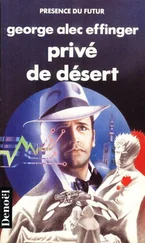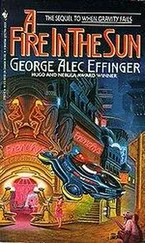Jehan was not amused. She read to him: ‘“Hast thou not seen those who pretend that they believe in that which is revealed unto thee and that which was revealed before thee, how they would go for judgment in their disputes to false deities when they have been ordered to abjure them? Satan would lead them all astray.’”
Heisenberg laughed heartily. “Your Allah isn’t just talking about Gottingen there,” he said. “He’s got Bohr in mind, too, and Einstein in Berlin.”
Jehan frowned at his impiety. It was the irreverence and ignorant ridicule of the kafir, the unbeliever. She wondered if the old religion that had never truly had any claim on her was yet still part of her. She wondered how she’d feel after all these years, walking the narrow, crowded, clangorous ways of the Budayeen again. “You mustn’t speak that way,” she said at last.
“Hmm?” said Heisenberg. He had already forgotten what he’d said to her.
“Look out there,” said Jehan. “What do you see?”
“The ocean,” said Heisenberg. “Waves.”
“Allah created those waves. What do you know about that?”
“I could determine their frequency,” said the scientist. “I could measure their amplitude.”
“Measure!” cried Jehan. Her own long years of scientific study were suddenly overshadowed by an imagined insult to her heritage. “Look here,” she demanded. “A handful of sand. Allah created this sand. What do you know about it?”
Heisenberg couldn’t see what Jehan was trying to tell him. “With the proper instruments,” he said, a little afraid of offending her, “in the proper setting, I could take any single grain of sand and tell you — “His words broke off suddenly. He got to his feet slowly, like an old man. He looked first at the sea, then down at the shore, then back out at the water. “Waves,” he murmured, “particles, it makes no difference. All that counts is what we can actually measure. We can’t measure Bohr’s orbits, because they don’t really exist ! So the spectral lines we see are caused by transitions between two states. Pairs of states, yes; but that will mean an entirely new form of mathematical expression just to describe them, referencing tables listing every possible — “
“Werner.” Jehan knew that he was now lost to her.
“Just the computations alone will take days, if not weeks.”
“Werner, listen to me. This island is so small, you can throw a stone from one end to the other. I’m not going to sit on this freezing beach or up on your bleak and dreary cliff while you make your brilliant breakthrough, whatever it is. I’m saying goodbye.”
“What? Jehan?” Heisenberg blinked and returned to the tangible world.
She couldn’t face him any longer. She was pouring one handful of sand through the fingers of her other hand. It came suddenly to her mind then: If you had no water to perform the necessary ablution before prayer in the direction of Makkah, you were permitted to wash with clean sand instead. She began to weep. She couldn’t hear what Heisenberg was saying to her — if indeed he was.
It was a couple hours later in the alley now, and it was getting even colder. Jehan wrapped herself in her robe and paced back and forth. She’d had visions of this particular night for four years, glimpses of the possible ways that it might conclude. Sometimes the young man saw her in the alley shortly after dawn, sometimes he didn’t. Sometimes she killed him, sometimes she didn’t. And, of course, there was the open question of whether her actions would lead to her freedom or to her execution.
When she’d had the first vision, she hadn’t known what was happening or what she was seeing. She knew only the fear and the pain and the terror. The boy threw her roughly to the ground, ripped her clothing, and raped her. Then the vision passed. Jehan told no one about it; her family would have thought her insane. About three months later, the vision returned; only this time it was different in subtle ways. She was in the alley as before, but this time she smiled and gestured to the boy, inviting him. He smiled in return and followed her deeper into the alley. When he put his hand on her shoulder, she drew her father’s dagger and plunged it into the boy’s belly. That was as much as the vision showed her then. It terrified her even more than had the rape scene.
As time passed, the visions took on other forms. She was certain now that she was not always watching her future, the future, but rather a future, each as likely to come to pass as the others. Not all the visions could possibly be true. In some of them, she saw herself living into her old age in the city, right here in this filthy quarter of the Budayeen. In others, she moved about strange places that didn’t seem Islamic at all, and she spoke languages definitely not Arabic. She did not know if these conflicting visions were trying to tell her or warn her of something. Jehan prayed to know which of these versions she must actually live through. Soon after, as if to reward her for her faith, she began to have less violent visions: She could look into the future a short way and find lost objects, or warn against unlucky travel plans, or predict the rise and fall of crop prices. The neighbors, at first amused, began to be afraid of her. Jehan’s mother counselled her never to speak of these “dreams” to anyone, or else Jehan might be locked away in some horrible institution. Jehan never told her father about her visions, because Jehan never told her father about anything. In that family, as in the others of the Budayeen — and the rest of the city, for that matter — the father did not concern himself very much with his daughters. His sons were his pride, and he had three strong sons whom he firmly believed would someday vastly increase the Ashufi prestige and wealth. Jehan knew he was wrong, because she’d already seen what would become of the sons — two would be killed in wars against the Jews; the third would be a coward, a weakling, and a fugitive in the United States. But Jehan said nothing.
A vision: It was just past dawn. The young man — whose name Jehan never learned — was walking down the stone-paved street toward her alley. Jehan knew it without even peering out. She took a deep breath. She walked a few steps toward the street, looked left, and caught his eyes. She made a brief gesture, turned her back, and went deeper into the shadowy seclusion of the alley. She was certain that he would follow her. Her stomach ached and rumbled, and she was shaking with nervous exhaustion. When the young man put his hand on her shoulder, murmuring indecent suggestions, her hand crept toward the concealed knife, but she did not grasp it. He threw her down roughly, clawed off her clothing, and raped her. Then he left her there. She was almost paralyzed, crying and cursing on the wet, foul-smelling stones. She was found some time later by two women who took her to a doctor. Their worst fears were confirmed: Her honor had been ravaged irredeemably. Her life was effectively over, in the sense of becoming a normal adult female in that Islamic community. One of the women returned to Jehan’s house with her, to tell the news to Jehan’s mother, who must still tell Jehan’s father. Jehan hid in the room she shared with her sisters. She heard the violent breaking of furniture and shrill obscenity of her father. There was nothing more to be done. Jehan did not know the name of her assailant. She was ruined, less than worthless. A young woman no longer a virgin could command no bride price. All those years of supporting a worthless daughter in the hopes of recovering the investment in the marriage contract — all vanished now. It was no surprise that Jehan’s father felt betrayed and the father of a witless creature. There was no sympathy for Jehan; the actual story, whatever it might be, could not alter the facts. She had only the weeping of her sisters and her mother. From that morning on, Jehan was permanently repudiated and cast out from her house. Jehan’s father and three brothers would not even look at her or offer her their farewells.
Читать дальше












